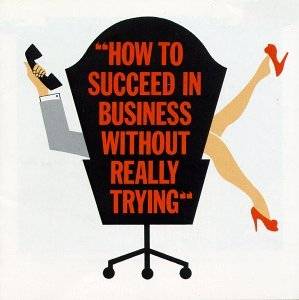 In a time when prices everywhere are rising and job layoffs are increasing, the opportunity to make quick, easy cash does not often present itself.
In a time when prices everywhere are rising and job layoffs are increasing, the opportunity to make quick, easy cash does not often present itself.
Luckily, the University of Illinois Department of Theatre wants to teach you How To Succeed in Business Without Really Trying.
Directed by Robert G. Anderson and choreographed by Sara Hook, Frank Loesser’s musical, How To Succeed in Business Without Really Trying, follows window washer J. Pierrepont Finch as he climbs the corporate ladder. Guided by the How to Succeed book, Finch lies, namedrops, cheats, and sleeps his way from mailroom attendee to chairman of the board.
Ensemble member Nico Brown describes How to Succeed as a social commentary on corporate America in the 1960s that features delightful music and dancing in between sexism, cheating, and lying.
“For me, How to Succeed is more than entertainment; it’s an exploitation of a sexist culture in the corporate world. It’s about Finch’s selfishness, Biggley’s ignorance, and Rosemary’s desperation,” Brown says.
But the show does not stop there. Anderson and Hook have created a buzzing corporate world that exists behind the main action. The entire cast remains onstage throughout the production, creating compelling subplots and building relationships between characters that, in any other show, would be considered marginal.
Ensemble member Hope Goldman says that one of her favorite parts is her ‘love duet’ with fellow ensemble member Nick Duran. “We’ve created a side story that we’re falling in love, which makes me more engaged in the acting side of the play. It has helped me create a character that I wouldn’t otherwise have found,” Goldman says.
Marty Scanlon, who plays Tackaberry, says that the rehearsal process has been fantastic, and that Anderson’s style of directing has allowed the actors some freedom to develop their characters: “[Anderson] is not the kind of person who likes to shove his ideas on you or tell you exactly what to do. He is much more interested in the actors creating something using their own unique view, and then, with his insight as director, shaping and molding the show based on what the actors bring to the roles.”
Anderson says that the leader is always switching in rehearsals, and that the cast members are often inspired by watching one another try new things. This fearlessness and confidence has built their strength as an ensemble.
Anderson and Hook aim to give the audience an invigorated idea of the musical theatre experience, putting their own touches on How to Succeed in an attempt to sharpen its satire and sarcasm.
“[Sara and I] have a sort of irreverence for the form [of musical theatre]. I love the traditions of classical musical theatre, but I want to thwart the expectations of the viewer,” Anderson says.
“We’re coming at it with a mix of love and contempt,” Hook adds.
The pair is not afraid to be extremists when it comes to theatrical direction.
“[How to Succeed] is a musical with good acting and a unique and visually compelling concept. The music is great, the writing is funny and timely (even after almost 50 years), and it’s not just a rehashing of a Broadway production,” says Scanlon. “I think we really ‘succeed’ in a lot of ways.”
How to Succeed in Business Without Really Trying runs March 5–15 at the Krannert Center for the Performing Arts in Urbana.








